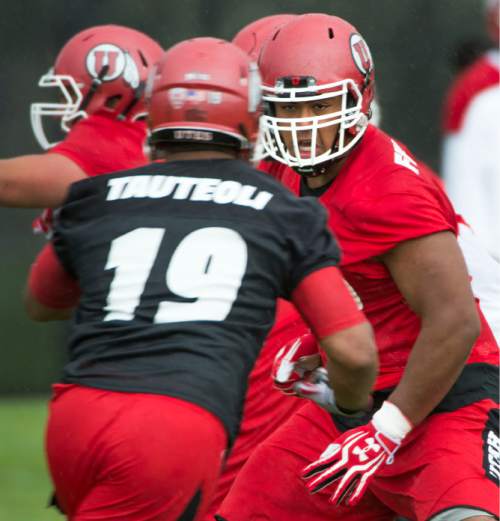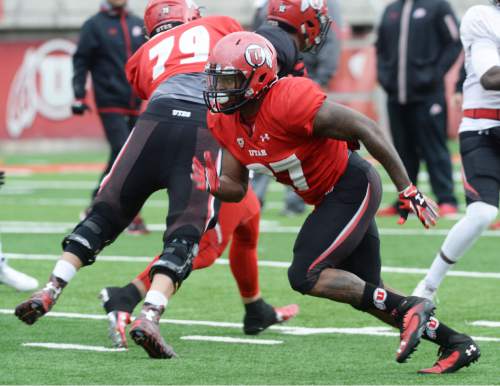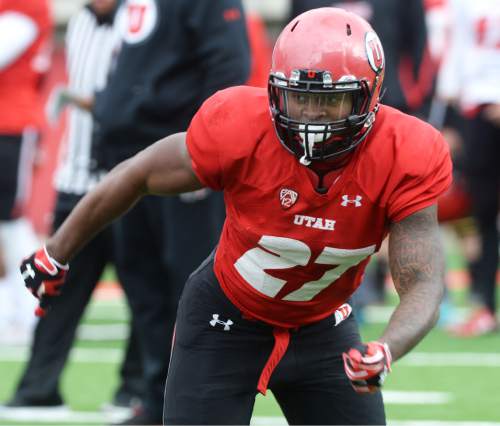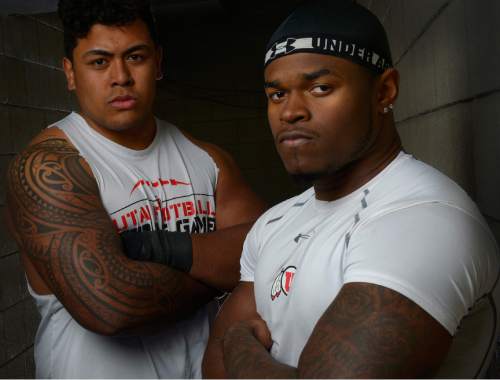This is an archived article that was published on sltrib.com in 2016, and information in the article may be outdated. It is provided only for personal research purposes and may not be reprinted.
He's faster now.
This spring, freshman running back Marcel Manalo has been seen cutting through the line of scrimmage and outracing defensive backs to the end zone. As a freshman, his coaches said he needed to work on conditioning; now, he leaves his pursuers winded.
But he can't outrun the pain around the small scar in the right side of his back where a bullet is still lodged underneath his skin.
"They can't really remove it," Manalo said. "Once in a while, it aches. But they said that would be normal."
Manalo, formerly Marcel Brooks-Brown before changing his name this spring, survived a shooting at a house party near the University of Utah campus last September. Now he and fellow shooting victim Lo Falemaka, a junior center who spent all of last season sitting out in recovery, are working on the business of getting on with their football careers.
They don't want to be the 'Utes Who Lived.' Like their teammates, they hope to make their names on the field. And while they'll never be fully removed from the shooting and will always bear the scars of the incident, their effort to be better football players is showing.
"I know one time, when we had roll call in the weight room, and we heard Marcel's name, everyone was looking around like, 'Wait, Marcel's back already?' " senior lineman Isaac Asiata said. "So that just goes to show how tough those guys are. They got hurt, and now they're right back in the mix."
Manalo is the third running back on the depth chart, but could be up for more snaps given the way he's been playing through two weeks of camp. Falemaka, whose given name is Haile, is listed as backup center, a new position he said he's enjoying a lot.
But getting this far has been a painful process.
Manalo was shot twice — one bullet in his left side, and the other in his back — and lost a lot of blood at the scene, but was eventually released the same day he was admitted, and attended class the following Monday.
Falemaka's wound was dire: He was shot below his belly button, and the bullet tore through his small intestine. He was hospitalized for more than a week as doctors worked to repair him.
After a recent practice, he lifted up his jersey to reveal a roughly 8-inch-long scar, resembling a millipede crawling up toward his chest. It hurts in the middle of practice. It hurts when he's lifting.
"The recovery process took forever," Falemaka said. "There were times where I was like, 'This isn't even worth it. Why am I even doing this?' "
Manalo recounted the harrowing events of the shooting for the Tribune in December. Falemaka added that the shooter, one of three suspects who still haven't been apprehended for the incident, was standing feet away from him. While a teammate's girlfriend tried to push him away from the men, who had been booted from the party, there was no time to react once he saw the gun.
Neither said they ever expected to be in any danger so close to campus. Manalo's parents flew to Salt Lake City the next day, and wanted to bring him home to Sacramento.
"They said, 'We sent you to Utah because we thought it was going to be a nice place for you,' " Manalo recounted. "I said, 'It's still a nice place, it's just a weird coincidence. A weird accident.' I'm still 100 percent sure about being safe here. I'm not scared at all. It's a nice place."
A local star for Cottonwood High, Falemaka said he never felt threatened before in his hometown. But gun violence is also not unfamiliar to his family: Within a week of the shooting, Falemaka said his cousin was also shot, and they ended up on the same floor of the University of Utah hospital at the same time.
But while his cousin has since moved out of the state, Falemaka has stayed with the Utes to continue his football career. The support of his teammates has helped.
"The night I got shot, the team filled up the whole hospital floor that I was on," he said. "It was completely packed. Everybody showed me love and support. They were asking, 'How are you feeling? Are you going to come back to play football?' I'm still walking. I'm thankful to be alive."
On the team, coaches have kept the same instructions for players who want to socialize: Stay together, and make good choices. While the directives haven't changed, players said they take those instructions a little closer to heart since the shooting.
The incident bound Manalo and Falemaka together. They weren't really friends beforehand, but now they talk a lot. They call each other "blood brothers," in a bit of grisly humor.
Manalo was healthy before Falemaka was, and he helped motivate him to return to football. When one felt the pain from their wounds, the other would say, "push through it."
It's been eight months since the shooting, and Manalo expects at this point the perpetrators won't be caught. He said it was "irritating at first," but he has tried to get closure on his own terms.
"Honestly, I'm just happy to be alive," he said. "I feel like God is going to deal with that end of the bargain."
The duo is concentrating on class and football. It's what they can control. And perhaps through their work and dedication to the game, they hope to find a way to push past the headlines they made for being shot, and start making some for the way they play.
"It is a devastating thing to go through," Asiata said. "But they've made their way back. I can't wait to see what kind of careers they have here. I'm excited to find out."
Twitter: @kylegoon —
About Marcel Manalo
• Third-string running back on depth chart
• 1,972 yards and 29 touchdowns as a senior at Rio Linda HS
• Formerly Marcel Brooks-Brown, changed name this spring
About Lo Falemaka
• Backup center on depth chart
• Graduate of Cottonwood High
• Played in two games last fall prior to shooting









